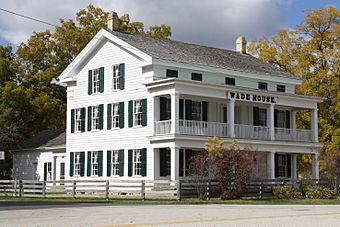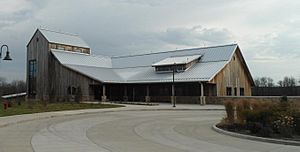Sylvanus Wade House facts for kids
Quick facts for kids |
|
|
Sylvanus Wade House
|
|

Wade House in 2012
|
|
| Location | Kettle Moraine Scenic Drive, Greenbush, Wisconsin |
|---|---|
| Nearest city | Plymouth, Wisconsin |
| Area | 0.4 acres (0.16 ha) |
| Built | 1849 |
| Architect | Charles Robinson |
| Architectural style | Greek Revival |
| NRHP reference No. | 71000041 |
| Added to NRHP | October 26, 1971 |
The Sylvanus Wade House was once a busy inn where travelers could rest and eat. It's located in Greenbush, Wisconsin, USA. Back in the mid-1800s, people traveled by stagecoach, and this house was a popular stop. But when railroads came, stagecoaches weren't needed as much. Today, the Wade House is a cool historical site you can visit!
Contents
Building a New Life in Greenbush
Sylvanus Wade's Big Plans
In 1844, a man named Sylvanus Wade moved his family to the Greenbush area. He bought a lot of land, hoping to build a whole new town there. His family first lived in a log cabin. As his family grew and more visitors came, they kept making the cabin bigger.
The Grand "Half Way House" Inn
Between 1848 and 1851, a large, three-story wooden house was built. It was designed in the popular Greek Revival style, which looked very fancy. Sylvanus Wade started calling it his "Half Way House." It was located right in the middle of the journey between the bigger cities of Fond du Lac and Sheboygan, Wisconsin. This made it a perfect place for travelers to stop and rest during the 1850s and 1860s.
Why the Inn Closed Down
The Wade House was very popular for many years. However, things changed when railroads started to become common. People began traveling by train instead of horse and stagecoach. A new railroad line was built, but it went through Glenbeulah, a town north of Greenbush. Because of this, the Wade House was no longer on the main travel route, and it stopped being a full-time inn.
Life After the Stagecoach Era
Family Home and Community Hub
Even after it stopped being an inn, the Wade family continued to live in the house. They often welcomed personal guests. The house also became a place for community events. People held business meetings, social gatherings, and even wedding anniversaries there. By 1917, people were already calling it the "historic old Wade House."
New Owners and Restoration Dreams
In 1941, the Wade family sold the house to Mr. and Mrs. M. J. Dorst. They were from Freeport, Illinois, but Mr. Dorst grew up nearby in Plymouth, Wisconsin. The new owners wanted to bring the house back to how it looked in the 1850s. The house remained a popular spot, often mentioned in local newspapers throughout the 1940s. For a couple of years, from 1944 to 1946, the local Methodist church even held its services there.
Bringing the Wade House Back to Life
Plans for Preservation
In 1948, Mrs. Martin Dorst first offered to sell the Wade House to the Wisconsin Historical Society. She later put it up for sale to anyone because it would cost a lot to update it for modern restaurants. In 1950, the state even thought about buying it to use as an office for the Kettle Moraine State Forest.
The Kohler Foundation Steps In
The house was finally sold in July 1950. The Kohler Foundation bought it, along with all its furniture, for $17,000. Their plan was to restore it and then give it to the historical society.
A Special Restoration Project
From 1950 to 1953, the Kohler Foundation worked hard to restore the Wade House. They wanted it to look just like it did during the American Civil War era. This big project was led by Ruth Miriam DeYoung-Kohler. She wanted the restoration to honor her husband's sister, Marie Christine Kohler, who had loved the Wade House before she passed away in 1943.
Becoming a State Historic Site
In 1953, the beautifully restored Wade House was officially given to the State Historical Society of Wisconsin. A famous poet and writer, Carl Sandburg, was even there for the special ceremony.
The Wade House Today
A Popular Historic Destination
Today, the Wade House is a very important historical site. It is listed on the National Register of Historic Places. It's now part of the Wade House Historic Site, which is a museum run by the Wisconsin Historical Society.
More to Explore at the Site
The historic site includes more than just the inn. You can also visit two other important buildings: the Charles Robinson House and the Robinson-Herrling Sawmill. There's also the Wesley Jung Carriage Museum, which has a huge collection of horse-drawn vehicles from the 1800s. It's a great place to learn about how people traveled long ago!
 | Isaac Myers |
 | D. Hamilton Jackson |
 | A. Philip Randolph |




